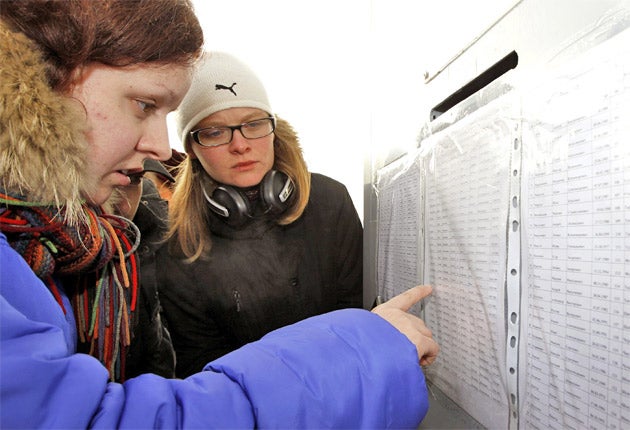Belarus jails 600 to stop 'senseless democracy'

Your support helps us to tell the story
From reproductive rights to climate change to Big Tech, The Independent is on the ground when the story is developing. Whether it's investigating the financials of Elon Musk's pro-Trump PAC or producing our latest documentary, 'The A Word', which shines a light on the American women fighting for reproductive rights, we know how important it is to parse out the facts from the messaging.
At such a critical moment in US history, we need reporters on the ground. Your donation allows us to keep sending journalists to speak to both sides of the story.
The Independent is trusted by Americans across the entire political spectrum. And unlike many other quality news outlets, we choose not to lock Americans out of our reporting and analysis with paywalls. We believe quality journalism should be available to everyone, paid for by those who can afford it.
Your support makes all the difference.Belarus jailed more than 600 opposition activists yesterday, ignoring Western criticism of a police crackdown on protesters after the contested re-election of President Alexander Lukashenko.
The activists were imprisoned for between five and 15 days, the Interior Ministry said.
Sunday night's protests were one of the strongest street challenges in years to Mr Lukashenko's hardline rule. Opposition leaders, including at least five candidates in the election, could receive up to 15 years in prison if convicted of inciting violence.
Mr Lukashenko, officially re-elected to a fourth term in office with nearly 80 per cent of the vote, has vowed to thwart any attempt at "revolution" and said there would be no more "senseless democracy" in the former Soviet republic.
The 56-year-old former state farm director has ruled Belarus, which forms a buffer between Russia and Nato countries, since 1994. His uncompromising tone suggests little immediate future for warmer relations with the European Union, which has been weighing how far to engage with the country of 10 million people on its eastern flank, and possibly provide financial aid.
Instead, Western criticism could push Mr Lukashenko closer to Russia. Minsk and Moscow recently patched up differences that had led Russia to cut back the energy subsidies that underpin Belarus's Soviet-style command economy and its generous social payouts. "Lukashenko understands that, in order to keep the support of the population, he must find ways to secure capital inflows," Eurasia Group said in a note. "With the Western option now closed off, Minsk will be forced to look to Russia and China."
Opposition parties said they would launch a "campaign of solidarity" for those people held by police, starting with a picket at the jail later in the day. "The dictatorship has united the opposition," said Vyacheslav Sivchik, leader of the Together movement.
Subscribe to Independent Premium to bookmark this article
Want to bookmark your favourite articles and stories to read or reference later? Start your Independent Premium subscription today.
Join our commenting forum
Join thought-provoking conversations, follow other Independent readers and see their replies
Comments